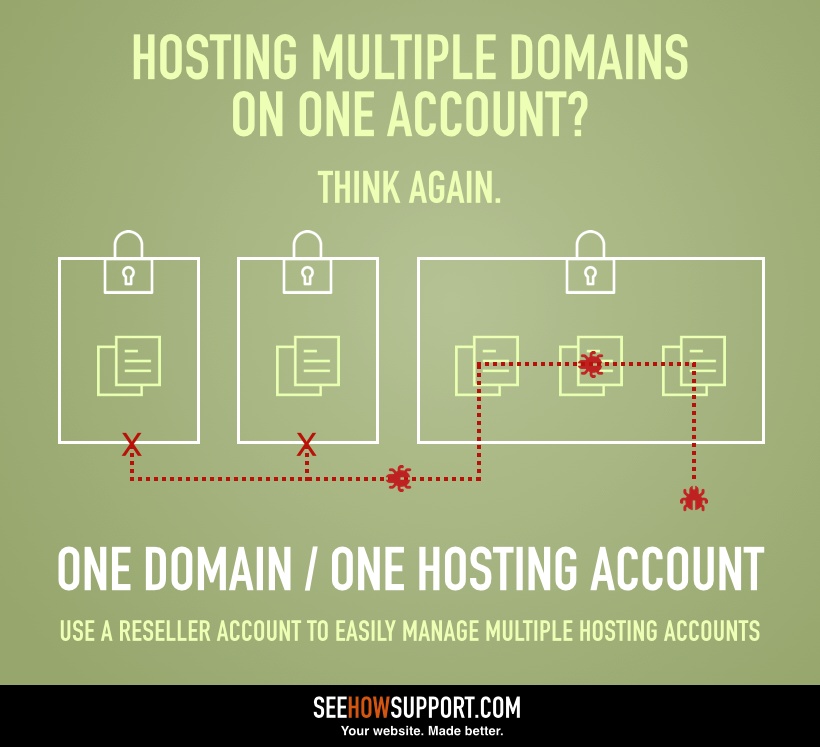Have only one domain per hosting account.
That’s my rule of thumb. If you want to know why, when there are exceptions, and how to best manage multiple domains, then read on!
Hosting companies are quick to sell you on the idea of hosting multiple domains on a single account…

…and business owners are quick to do the math: clearly, $6.95 per month for 5 websites is cheaper than 5 x $6.95 per month.
But there’s a hidden danger in this kind of thinking.
The way multiple domains work is they’re in separate folders within the root directory of your hosting account. And that means if a hacker gets into your account, they can access all of those folders. All your sites can be compromised at a single stroke.
If each domain is in a separate hosting account, you’ve isolated the individual sites. Assuming that you’ve got strong passwords on each account, that’s a lot of extra work for the hackers to do the damage they could do in a single account with multiple domains.
Yes, it costs more per month to have separate hosting accounts, but hosting these days is so inexpensive, and the uptime and reputation of your sites are so critical to your bottom line, that it makes no business sense to try and save a few dollars each month.
There are exceptions, of course. If you’re hosting a hobby site and a family site along with your business site, by all means, host multiple domains on one account. Or if you’re very diligent about updating, monitoring, and securing your site software, as well as using strong passwords for the hosting account and all site software, then you might be fine. But that too takes time and money, and few small businesses bother.
Some will argue that simply having good backups is enough and if your site gets hacked you can just restore all the domains with the backup. But most hacking isn’t about crashing sites – it’s about using sites to generate fake pages to scam search engines or to scrape data from your files and visitors or to send out spam emails. All of which can be happening without you knowing. Backups are only of use once you find out the hack has taken place, which may be long after the damage is done.
Others will argue that it’s easier to maintain multiple domains from a single account, but really, how often do you need to access your hosting account? Creating or deleting email account is probably the most common use, and for most small businesses, that doesn’t happen very often. It may take a little extra time and organization to maintain separate hosting accounts, but again, it’s very little compared to the danger of exposing multiple sites to a single hack.
Some Options for Multiple Hosting Accounts
Reseller Accounts and VPS
Most hosting companies offer what are called reseller accounts. These act like mini-hosting companies, allowing you to manage multiple hosting accounts from a single interface. What this means is that you can easily access your various sites from one place but to the rest of the world they’re separate accounts with separate passwords, file directories, and so on. It can also save you money: reseller accounts typically start around $20-30 per month, so if you have 5 websites, that’s only $4 – 6 per site.
Now, you need to make sure you have a strong password for your reseller account, because if hackers access it, then again they’ll have control over all of your sites.
A Virtual Private Server (VPS) is another relatively low-cost option for having multiple hosting accounts, though the price range starts a bit higher so you’d either need more sites or require more security to justify the costs. Reseller accounts, like a single basic hosting account, are on what’s called shared hosting.VPS accounts do share with other VPS accounts, but far fewer than shared hosting, though still not as isolated as a dedicated server. A VPS account will have the same or a similar control panel to a reseller account, allowing you to access your sites from one place.
Multiple Hosts
If quick access to all of your hosting accounts is not an issue, nor is saving a few dollars a month per site, another option is to host each of your sites with separate hosting companies. It’s no different in terms of having to keep track of passwords for each account, and the advantage is that if one host’s server goes down, your other sites are still up and running.
If security is paramount for your sites, using multiple hosts also offers some protection against situations when hackers break into one hosting account and manage to break the walls between hosting accounts. While those kinds of breaches are rare, the possibility of such a situation may be reason for you to spread the risk by placing each site on a different host.

What's Your Take?